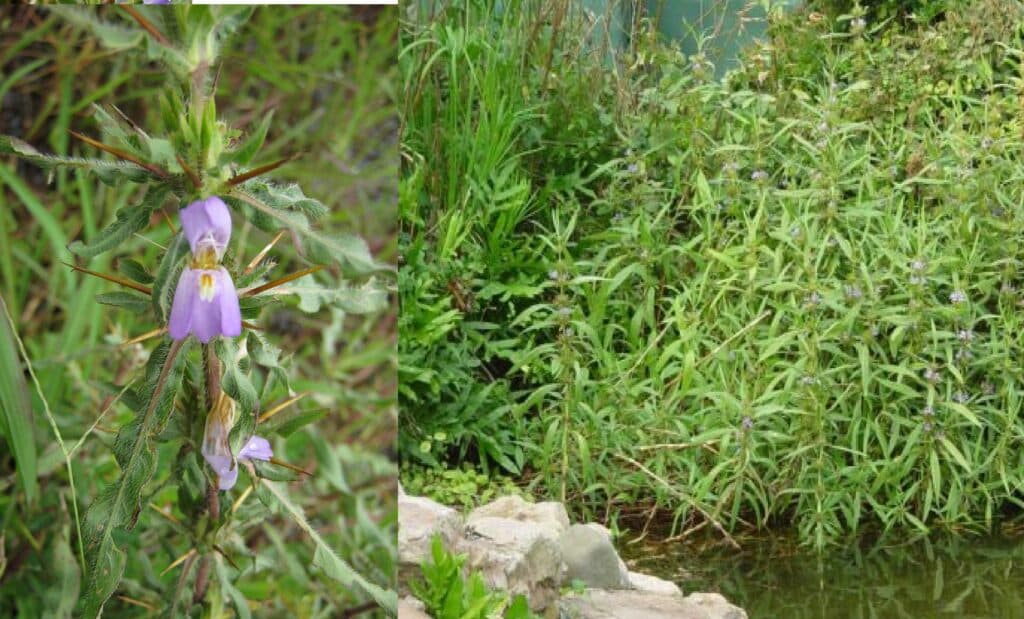Ayurvedic Benefits of Neeramulliya (නිරම්මුල්ලිය / Hygrophila schulli)
Neeramulliya (Hygrophila schulli), also known as Marsh Barbel, is a well-known medicinal herb in Ayurveda and traditional Sri Lankan medicine. It is widely used for its diverse therapeutic properties, with various parts of the plant-including roots, leaves, seeds, and the whole plant-being utilized for different health conditions.
Key Ayurvedic Benefits
- Diuretic Action: Neeramulliya is renowned for its potent diuretic properties, making it effective in promoting urine flow and supporting kidney health. It is commonly used in the management of edema (fluid retention), renal calculi (kidney stones), and urinary tract infections.
- Blood Purification & Detoxification: The herb acts as a blood purifier and detoxifier, helping to cleanse the body of toxins and support overall health.
- Liver Protection: Neeramulliya is used to stimulate liver function and treat hepatic diseases, including jaundice and other liver disorders
- Anti-inflammatory and Analgesic: Extracts of the plant, especially the seeds, have demonstrated significant anti-inflammatory and pain-relieving (anti-nociceptive) effects. It is traditionally used for joint pains, rheumatism, headaches, and skin inflammations1.
- Antioxidant Activity: The plant contains flavonoids and other compounds that provide antioxidant benefits, helping to combat oxidative stress and support cellular health.
- Antimicrobial and Antifungal: Neeramulliya exhibits antimicrobial and antifungal activities, which contribute to its use in treating bacterial infections, dysentery, and wounds.
- Support for Renal and Urinary Health: Used in Ayurveda and Siddha medicine as a remedy for conditions like anuria (absence of urine), dysuria (painful urination), oliguria (low urine output), and urolithiasis (kidney stones).
- Other Uses: The plant is also traditionally used for managing diabetes, tuberculosis, constipation, cough, and certain infertility cases
Common Conditions Treated
- Edema (swelling)
- Kidney stones and urinary tract issues
- Liver disorders (including jaundice)
- Rheumatism and joint pain
- Skin inflammation and wounds
- Dysentery and digestive complaints
- Body heat and detoxification needs
Preparation and Usage
Neeramulliya is available in various forms, including powders, decoctions (such as Neermulli Kudineer in Siddha medicine), and herbal teas. Decoctions are a common preparation in both Ayurveda and Siddha, often used as a first-line treatment for renal and urinary disorders.
In Ayurveda, H. schulli leaves and young stems are frequently used for the treatment of dysentery, edema, inflammation, cough, joint pains, bacterial infections, rheumatism, renal calculi, and other renal diseases, hepatic diseases, and microbial infections such as gonorrhea and urinary tract infections…
Summary Table: Main Benefits of Neeramulliya
| Benefit | Description |
|---|---|
| Diuretic | Promotes urine flow, supports kidney and urinary health |
| Blood purifier | Cleanses blood, aids detoxification |
| Hepatoprotective | Supports liver function, treats jaundice and hepatic diseases |
| Anti-inflammatory | Reduces inflammation, relieves pain |
| Antioxidant | Protects against oxidative stress |
| Antimicrobial | Fights bacterial and fungal infections |
| Renal support | Helps in kidney stones, urinary tract issues |
Conclusion
Neeramulliya (Hygrophila schulli) is a versatile herb in Ayurveda and traditional Sri Lankan medicine, valued for its diuretic, detoxifying, anti-inflammatory, and hepatoprotective effects. It is especially beneficial for conditions related to the kidneys, liver, and urinary system, and is also used as a general tonic and blood purifie

